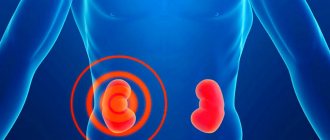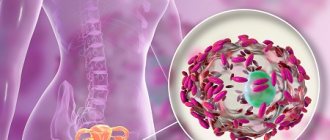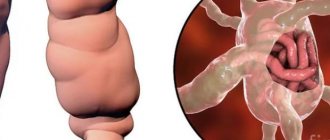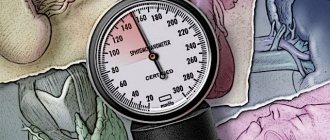Mute and patient
Lidia Yudina, AiF Health: Oleg Nikolaevich, how common are kidney diseases?
Oleg Kotenko : According to official statistics, 0.6% of the Moscow population has chronic kidney disease. However, one can only guess about the true incidence. We recently conducted a screening project, which was carried out under the leadership of the Department of Health in one of the districts of Moscow. During the screening, 94 thousand people were examined who did not complain of kidney problems, but donated blood for other diseases. 4% of them were diagnosed with chronic kidney disease at one stage or another.
The kidneys are called the silent and patient organ. The first problems appear when kidney function is already lost by 70%. Because of this, until 2013, ³⁄₄ of patients first learned of their disease in the intensive care unit, when they were already indicated for renal replacement therapy. In 2021, there were only 50% of such patients. Despite the positive trend, this is a very high figure. In Western Europe, no more than 20% of patients begin dialysis for emergency reasons.
Swelling and unexplained weakness. What you need to know about kidney disease? More details
– What should be done to identify possible problems at an early stage?
– Take a blood test for creatinine at least twice a year. This is the most important indicator of kidney function.
“But blood, urine and biochemistry tests were excluded from the medical examination program this year. Now they are done only according to indications.
– From January 1, 2021 in Moscow, when taking a blood test, all patients will have their GFR (glomerular filtration rate, which can be used to detect even minor impairments in kidney function even with a normal creatinine level) determined. If the analysis reveals abnormalities, the person will be referred to a nephrologist. If the indicator is borderline, the patient will be told about the rules of renal failure.
Article on the topic
Less salt, more water. 8 Basic Rules for Healthy Kidneys
What is kidney inflammation - symptoms and treatment
Kidney inflammation is a common disease that patients in most cases endure on their feet and treat it as a common ailment. Such carelessness most often turns into a serious diagnosis, which not only significantly worsens the quality of life, but is also very expensive to treat.
Every medical services center (Rostov-on-Don) knows many stories when lost time and improper treatment led the patient to a difficult situation where he grasps at any opportunity just to get better.
The kidneys are the most important organs in the filtration and cleansing system of our body. So important that nature duplicated them. You know very well that humans do not have many paired organs.
The most important thing to keep them healthy is prevention. A healthy lifestyle and proper physical activity charge your body with youth and health, then you will not need any paid medical services center.
What to do if suspicious symptoms appear:
- Pain in the lower back; in women, pain in the lower abdomen is often added;
- An increase in body temperature from slight indicators (from 37 degrees) to 39 degrees;
- Fatigue and loss of strength;
- Uncontrollable small portions of urine are also possible;
- Changes in urine characteristics - cloudiness or darkening.
It is quite obvious that such symptoms can occur in many other diseases, for example, gynecological symptoms are similar. And this is a common misconception about the ability to make a correct diagnosis.
Another important point is that the inflammatory process itself can be associated with a number of reasons. These include various bacteria, a violation of the trophism (nutrition) of the kidney due to deformations, and prolapse, displacement of the organ itself.
Naturally, each case will have a completely different treatment.
In most cases, patients believe that their inflammatory process is associated with hypothermia and the development of bacteria. To relieve inflammation, buy broad-spectrum antibiotics and begin self-medication. This can have an effect in some situations, but also, most experiments end in a trip to the doctor, damaged by one’s own microflora and already difficult to diagnose due to indicators blurred by drugs.
Even worse is the independent prescription of diuretic folk remedies, which increase the load on an already inflamed organ. As a result, severe exacerbation with a rise in temperature to 39 is common in this situation.
Therefore, before deciding how to relieve kidney inflammation, it makes sense to conduct a full diagnosis, which is offered by medical centers in Rostov-on-Don, and tests.
If you still think that you really have an inflammatory process of the kidneys, then do at least an ultrasound examination, even based on the result of one and a conversation with a diagnostician, you will be able to understand the right path for selecting therapy.
Where to have an ultrasound (Rostov-on-Don) is decided by everyone independently, but we recommend choosing medical centers with expert-class equipment that most accurately determines the condition of the organs.
While the process has not been treated, it is possible to identify what caused the kidney inflammation, symptoms, and treatment is already prescribed exactly in accordance with the situation of this particular patient.
Heratsi Medical Center offers to start treatment of kidney inflammation on the most favorable terms.
- You can get a free appointment with a therapist who will write out all the necessary directions for tests and diagnostics, so that you can come to the urologist prepared for a quick diagnosis and treatment;
- Undergo an ultrasound scan using expert-class equipment without extra charges and receive explanations in human language on how to decipher the diagnosis;
- Take tests in our center and receive the results by email (a very convenient format, not only to reduce the time it takes to get the results, but also for safety);
- Get advice from a specialist, with the opportunity to choose a doctor;
- In the treatment room, you can give injections for kidney inflammation, both intramuscularly and intravenously;
- Our medical center openly publishes: prices, services, reviews and doctor pages;
- Online appointment with any doctor at a time convenient for you.
Take advantage of preferential offers - make an appointment with a urologist at your convenience.
17th century diet
-What are these rules?
– Firstly, in order to keep your kidneys healthy, you need to eat right. The most healthy diet is the diet of the 17th century, when even salt was difficult to obtain, so people ate only fresh foods. In the production of fast food and shelf-stable products, a huge number of different reagents are used, which must undergo decontamination in the human body. And in order to destroy them and make them safe, the kidneys must work to the limit of their capabilities. Secondly, you need to be careful when taking antibiotics, analgesics and antiviral drugs. These rules need to be known not only to patients of nephrologists, but also to people at risk.
Click to enlarge
- Who is included in it?
– These are patients with arterial hypertension, diabetes mellitus, atherosclerosis, and chronic diseases that require painkillers. Among them there are especially many patients with pathologies of the musculoskeletal system. People at risk include people who were born with low body weight (particularly premature babies), and those who abuse nutritional supplements and follow diets with a high protein load.
Article on the topic
A capricious couple. Which kidney diseases are deadly and how to avoid them
Kidney diseases - main types
The content of the article
All problems with the urinary system can be divided into inflammatory and non-inflammatory. In the first case, the cause of the disease is an infection or an autoimmune process.
Non-inflammatory pathologies include the deposition of salts and stones, disruption of the kidneys, and the appearance of benign and malignant tumors. The most common inflammatory pathology is pyelonephritis. The process involves the calyces, pelvis, and parenchyma of the organ, and the cause of inflammation is the penetration of bacteria:
- Escherichia coli;
- Coccal flora;
- Proteev, etc.
More often, pyelonephritis affects women whose infection penetrates through a wide, short urethra, and who often suffer from chronic cystitis. Another inflammatory disease is glomerulonephritis, in which the kidney glomeruli are damaged, and the causes are both infection and an autoimmune attack of one’s own antibodies.
Symptoms of inflammation in the kidney are pain, fever, urinary retention, and with glomerulonephritis, also an increase in pressure, urine with blood.
Other kidney diseases include:
- Prolapse of an organ (one or two) – nephroptosis;
- Enlargement of the kidney cavity – hydronephrosis;
- The formation of stones in the kidneys and bladder – nephrolithiasis.
Hereditary pathologies of the system (lipoid nephrosis, amyloidosis), tumors and necrosis of the kidney, and renal dystrophy are much less common. Any disease without treatment can result in kidney failure, a condition in which the organs cannot filter the blood fully.
In severe cases of renal failure, only hemodialysis keeps a person alive.
Diagnostics
Diagnosis of diseases of the urinary system begins with taking an anamnesis. After this, a doctor’s examination is carried out, which includes palpation of the kidneys (palpation) - normally they should not be palpated; percussion of the kidneys (tapping the corresponding part of the body), palpation of the bladder area, examination of the external genitalia.
Among the instrumental examination methods:
- Blood analysis. Aimed at detecting increases in blood urea, creatinine and uric acid.
- Urinalysis (general and Nechiporenko). Determines the presence of impurities, markers of inflammation, and inadequate function of the kidney filtration barrier.
- Ultrasound, X-ray, CT, MRI. Changes in the size and shape of the kidneys, the presence of neoplasms (tumors and cysts) are determined, and the presence of stones due to urolithiasis is detected.
Common symptoms of kidney and urinary tract diseases
When faced with symptoms that indicate disturbances in the functioning of the urinary system, you need to consult a urologist as soon as possible. There are some common manifestations of pathologies:
- urinary disorders (frequency and/or quality),
- changes in urine color
- blood in urine
- pain and burning when urinating,
- pain in the lower back and stomach,
- increased body temperature and blood pressure,
- general weakness, drowsiness, headache,
- the appearance of swelling of the limbs and face due to impaired removal of fluid from the body,
- loss of appetite, bad taste in the mouth and bad breath.
Kidney disease also affects a person’s appearance. A specific characteristic is the appearance of dark circles and puffiness under the eyes, pallor, yellowing and dry skin.
Diagnosis and treatment of pyelonephritis
To diagnose pyelonephritis, a bacterial culture of urine is needed to determine the sensitivity of the infectious agent to antibacterial drugs, since pyelonephritis is caused by different strains of microorganisms that react differently to antibacterial drugs.
In addition to bacteriological analysis, the main diagnostic methods include blood and urine analysis, as well as ultrasound of the kidneys to identify stones, tumors, the position of the kidney and diagnose the condition of blood vessels. Based on the examination results, the doctor selects the optimal antibacterial agents, which are the basis for the treatment of pyelonephritis.
The danger of poor kidney function
Impaired kidney function at any stage of urine excretion or formation is fraught with problems. The fact is that urine contains a large amount of toxins and metabolic products. If the outflow of urine is impaired, then these substances will accumulate in the body and poison it. This process is called autointoxication. Substances such as:
- ammonia;
- urea;
- creatinine;
- protein breakdown products that are highly toxic.
The result will be disruption of the functioning of organs and metabolic processes. In high concentrations, substances can cause irreversible damage and death. It is important to know what symptoms indicate poor kidney function.
Medicines for kidney inflammation
Any inflammatory process in the kidneys requires urgent use of antibacterial or antiseptic drugs. Typically, uroantiseptics - drugs that work only at the local level - are used to treat chronic infections outside of exacerbation, in the initial stages of pyelonephritis.
For cystitis and urethritis, they are prescribed to prevent infection from entering the kidneys through the ascending route. Antibiotics in injections and tablets are indicated for acute pyelonephritis, glomerulonephritis, as well as for relapse of a chronic disease.
Antibiotics quickly suppress the infectious process, eliminating inflammation. Most often prescribed:
- Fluoroquinolones – Ofloxacin, Levofloxacin, Zanotsin, Tsiprolet;
- Penicillins – Amoxicillin, Amoxiclav, Flemoclav;
- Cephalosporins – Ceftriaxone, Steritsef, Cephatrin.
Of the uroantiseptics, nitrofurans (Furadonin, Furomag, Furazidin, Nifuratel) have a powerful anti-inflammatory effect. Bacteria rarely develop resistance to these drugs, so they can be used repeatedly.
Nitrofurans have few side effects, but in acute forms of pyelonephritis they will be powerless.
Why do kidney and ureter diseases occur?
The main factors that provoke the development of kidney and ureter diseases include:
- hypothermia of the body (especially in the lumbar region);
- untreated sexually transmitted infections,
- endocrine disorders;
- decompensated diseases of the cardiovascular system;
- ignoring intimate hygiene;
- low immunity;
- chronic fatigue, frequent stress;
- structural anomalies of the urinary system organs;
- mechanical injuries to the kidneys and bladder;
- previous chemotherapy;
- genetic predisposition;
- poor nutrition.
By the way
Chronic pyelonephritis, as a rule, worsens in spring and autumn. Therefore, at this time, for prevention, you can take herbal complexes with diuretic, anti-inflammatory and antibacterial effects.
To prevent cystitis, it is important to observe good personal hygiene. In the prevention and complex treatment of this disease, diuretic teas and dietary supplements with anti-inflammatory and antibacterial effects can be used. To prevent cystitis and pyelonephritis, it is important to keep your lower back warm and not overcool.
To the doctor!
You should consult a specialist if you experience:
- fluid retention in the body, swelling on the face and legs constantly;
- persistent increase in blood pressure;
- the presence of blood in the urine;
- regularly recurring cystitis.
How are kidney and ureter diseases treated?
Treatment depends on the disease and its stage, as well as the presence of concomitant pathology. It includes conservative therapy (drugs affecting bladder activity, prostate volume, litholytic and lithokinetic drugs, diuretics, antispasmodics, immunomodulators, antipyretics and anti-inflammatory drugs) and surgical methods in cases where conservative therapy is not indicated or is not effective .
In our clinic, we perform endoscopic and laparoscopic operations with minimal intervention in the body, which allow us to completely remove pathological neoplasms of organs. You can find detailed descriptions of the operations we perform in the “Treatment Methods” section.
What threatens our kidneys and how to avoid it
According to statistics, almost 4% of the population has some form of kidney disease.
Although official statistics call women more prone to such diseases, in reality men suffer from them, although less, but not much. The difference between official data and real data is explained by the reluctance of men to go to doctors with such “little things.” As a result, appointments are mainly received by those representatives of the stronger half whose illness has reached a critical point and is simply impossible to endure any longer. In the best case, such a patient seeks help himself, in the worst case, he is taken to the doctor by an ambulance team. There are some signs of kidney disease that can indicate a problem even without being examined by a doctor, whom you still need to see. These symptoms include:
- Pain, tingling in the kidney area.
- Pain in the groin or genitals, especially when urinating.
Diuretics for kidney treatment
Diuretics, or diuretics, are indicated for almost all pathologies of the urinary system. Without increasing the amount of urine excreted, it is impossible to get rid of pyelonephritis, glomerulonephritis, and urolithiasis.
Even with renal failure and atrophic processes, these medications are prescribed to prevent inflammation.
The most famous remedies:
- Lasix;
- Furosemide;
- Torasemide;
- Hydrochlorothiazide;
- Mannitol.
If a person has to take diuretics for a long time, one should opt for potassium-sparing diuretics, which will help preserve vital salts in the body. This is Veroshpiron, Aldakton. A number of diuretics (mercury, with ammonium chloride, Theophylline) are strictly prohibited for kidney pathologies.
When there is a sharp stagnation of fluid, severe swelling, the person is given Furosemide - it has a powerful but short-term effect. In mild cases, it is preferable to choose a herbal medicine - infusions with birch buds, corn silk, bearberry, lingonberry leaves.
Analgesic drugs
Taking painkillers is indicated for most kidney diseases, because almost all of them are accompanied by pain. If the pain is not caused by a spasm, but by an acute inflammatory process, taking antispasmodics may be useless, and then nonsteroidal anti-inflammatory drugs (NSAIDs) are recommended to the patient.
They do not affect the causes of the pathology, and temporary relief from pain and normalization of temperature should not be misleading. In parallel, it is imperative to carry out pathogenetic therapy aimed at eliminating the infection.
NSAIDs are also indicated for pain due to:
- Nephroptosis;
- Urolithiasis;
- Glomerulonephritis;
- Cysts, tumors, etc.
Taking NSAIDs leads to the cessation of the production of inflammatory mediators - prostaglandins. The pain subsides for some time, and the latest generation of drugs provide a more pronounced and prolonged analgesic effect.
For the treatment of kidneys, it is better to purchase drugs such as Meloxicam, Ketanov, Ketonal Duo, Dexalgin, Ketoprofen. For acute, unbearable pain, they are administered in the form of intravenous and intramuscular injections.
Prevention of kidney and urinary tract diseases
A healthy lifestyle, adequate drinking regimen, and control of chronic diseases reduces the risk of developing diseases of the genitourinary organs. Periodic visits to the doctor and basic examinations increase the chances of protecting yourself from health problems, including pathologies of the kidneys and ureters.
Basic preventive measures:
- Avoid hypothermia, especially in the lumbar region.
- Eat properly and balanced.
- Quit smoking and minimize alcohol intake.
- Follow the rules of intimate hygiene.
- Treat inflammatory and infectious processes in a timely manner.
- Systematic examinations by specialized specialists.










